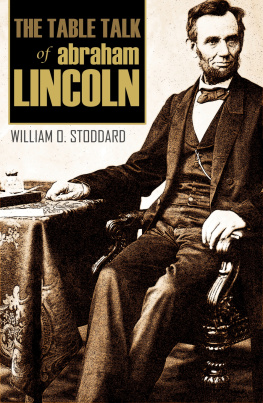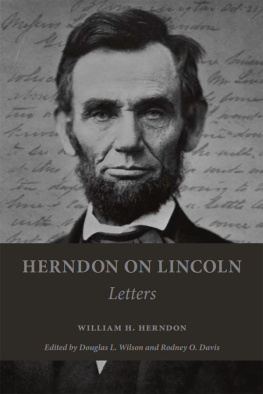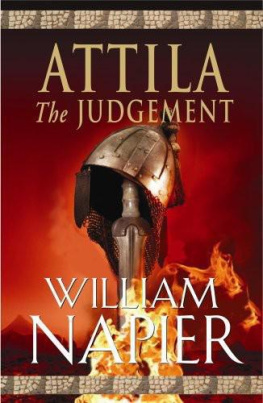ADVANCE PRAISE FOR THIS INFERNAL WAR
Timothy Mason Roberts has unruffled a vitally important collection of correspondence that complicates our traditional understanding of Union soldiers and civilians. The Standards talk in stunning detail about race, politics, and the daily grind of the Civil War on the lives of one particular family who loathed the idea of a war for the liberation of enslaved African Americans. This collection is vitally important to our understanding of the most pivotal chapter in American history.
BRIAN CRAIG MILLER, editor of Civil War History and author of A Punishment on the Nation: An Iowa Soldier Endures the Civil War (Kent State University Press)
With its combination of military, civilian, home front, and unusual political elements, this volume has wide appeal for both a scholarly and popular audience. The Standards frank discussions of race, sex, and the traumatic effects of war on both soldiers and their families make this a particularly valuable collection. There just arent many complete collections from a Copperhead couple, and Robertss editing and analysis successfully place the letters into proper historical and historiographic context. It is an important work.
BRADLEY KEEFER, author of Conflicting Memories on the River of Death: The Chickamauga Battlefield and the Spanish-American War, 18631933 (Kent State University Press)
William Standard was not the soldier we expect to see. He did not go to war to save the Union or free the slaves. More likely he went to stave off creditors and maintain his standing in the community. Both he and his wife, Jane, had family ties to the South, and neither had warm feelings toward Republicans. In fact, both could be counted as Copperheadsantiwar Democrats. We dont find many letters of Copperhead soldiers in the archives, and that is what makes This Infernal War such a gold mine for students of the Civil War.
JENNIFER L. WEBER, associate professor, University of Kansas
This Infernal War
CIVIL WAR IN THE NORTH
Broken Glass: Caleb Cushing and the Shattering of the Union John M. Belohlavek
Banners South: A Northern Community at War Edmund J. Raus
Circumstances are destiny: An Antebellum Womans Struggle to Define Sphere Tina Stewart Brakebill
More Than a Contest between Armies: Essays on the Civil War Edited by James Marten and A. Kristen Foster
August Willichs Gallant Dutchmen: Civil War Letters from the 32nd Indiana Infantry Translated and Edited by Joseph R. Reinhart
Meades Army: The Private Notebooks of Lt. Col. Theodore Lyman Edited by David W. Lowe
Dispatches from Bermuda: The Civil War Letters of Charles Maxwell Allen, U.S. Consul at Bermuda, 18611888 Edited by Glen N. Wiche
The Antebellum Crisis and Americas First Bohemians Mark A. Lause
Orlando M. Poe: Civil War General and Great Lakes Engineer Paul Taylor
Northerners at War: Reflections on the Civil War Home Front J. Matthew Gallman
A German Hurrah! Civil War Letters of Friedrich Bertsch and Wilhelm Stngel, 9th Ohio Infantry Translated and Edited by Joseph R. Reinhart
They Have Left Us Here to Die: The Civil War Prison Diary of Sgt. Lyle G. Adair, 111th U.S. Colored Infantry Edited by Glenn Robins
The Story of a Thousand: Being a History of the Service of the 105th Ohio Volunteer Infantry in the War for the Union, from August 21, 1862, to June 6, 1865 Albion W. Tourge, Edited by Peter C. Luebke
The Election of 1860 Reconsidered Edited by A. James Fuller
A Punishment on the Nation: An Iowa Soldier Endures the Civil War Edited by Brian Craig Miller
Yankee Dutchmen under Fire: Civil War Letters from the 82nd Illinois Infantry Translated and Edited by Joseph R. Reinhart
The Printers Kiss: The Life and Letters of a Civil War Newspaperman and His Family Edited by Patricia A. Donohoe
Conspicuous Gallantry: The Civil War and Reconstruction Letters of James W. King, 11th Michigan Volunteer Infantry Edited by Eric R. Faust
Johnsons Island: A Prison for Confederate Officers Roger Pickenpaugh
Lincolns Generals Wives: Four Women Who Influenced the Civil Warfor Better and for Worse Candice Shy Hooper
For Their Own Cause: The 27th United States Colored Troops Kelly D. Mezurek
Pure Heart: The Faith of a Father and Son in the War for a More Perfect Union William F. Quigley Jr.
Our Little Monitor: The Greatest Invention of the Civil War Anna Gibson Holloway and Jonathan W. White
This Infernal War: The Civil War Letters of William and Jane Standard Edited by Timothy Mason Roberts
2018 by Timothy Mason Roberts
All rights reserved
Library of Congress Catalog Card Number 2017016302
ISBN 978-1-60635-335-6
Manufactured in the United States of America
Library of Congress Cataloging-in-Publication Data
Names: Standard, William M., 1822- | Roberts, Timothy Mason, 1964-editor.
Title: This infernal war : the Civil War letters of William and Jane Standard / edited by Timothy M. Roberts.
Other titles: Civil War letters of William and Jane Standard
Description: Kent, Ohio : The Kent State University Press, [2018] | Includes bibliographical references and index.
Identifiers: LCCN 2017016302 (print) | LCCN 2017016133 (ebook) | ISBN 9781631012723 (ePub) | ISBN 9781631012730 (ePDF) | ISBN 9781606353356 (hardcover : alk. paper)
Subjects: LCSH: Standard, William M., 1822---Correspondence. | Standard, Jane, 1828---Biography. | United States. Army. Illinois Infantry Regiment, 103rd (1862-1865)--Biography. | Soldiers--United States--Correspondence. | Husband and wife--United States--Correspondence. | Copperhead movement. | United States--History--Civil War, 1861-1865--Protest movements. | United States--History--Civil War, 1861-1865--Personal narratives. | Public opinion--United States--History--19th century. | Farmers--Illinois--Fulton County--Biography.
Classification: LCC E505.5 103rd (print) | LCC E505.5 103rd .S75 2017 (ebook) | DDC 973.7/473092 [B] --dc23
LC record available at https://lccn.loc.gov/2017016133
22 21 20 19 18 5 4 3 2 1
Editorial Practices, Sources,
and Acknowledgments

The Standards letters came into the possession of Dorothy Standard Currens (ne Dorothy Ann Standard), the Standards great-granddaughter, in 1936. A recent University of Illinois graduate, Dotty Standard carefully removed the letters from their mailing envelopes and ordered and numbered them. For the next few years she submitted samples and book proposals to publishers, though without success. One literary agent wrote that the letters are interesting to read, but there is no drama about them and they do not touch any high spots in the war or at home. I am certain that publishers would demand that in such material., keyword Standard. Most of the original letters are quite legible, especially Williams, except a few he wrote in pencil at the bottom of letters from Jane. Some, especially messages by the Standards children, are more challenging. Thankfully, neither of the Standards resorted to the common nineteenth-century practice of crossing their lettersthat is, of trying to save paper and expense by turning a letter ninety degrees and writing across the message already written. Both the microfilm and the AHC online copies of the letters have been used for their transcription.










